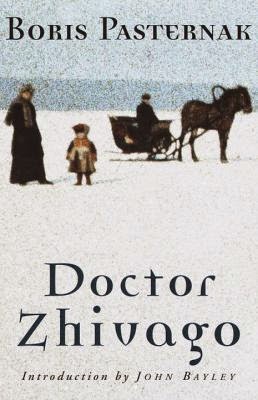Book Review: Dr. Zhivago
“How wonderful to be alive, he thought. But why does it always hurt?”
I got into Russian literature in college. In my Freshman year, I needed to take a class that satisfied the "Letters" GE requirement. There were a lot of interesting literature classes, but I had to choose one. My brother had recently married a then-Russian-citizen. We both enjoyed reading, but we didn't have a lot of shared reading experience. So, I decided to take Russian Novels.
I was one of two people who was not a Russian major, and one of two people who did not serve their mission in Russian. And no, the other person in each of those groups was not the same person. So, in terms of understanding the Russian culture and Russian world, I was behind the game. But I loved that class. The professor loved Russian literature, and he made us love it. And, even if I was behind, I got one of the highest grades in the class, so I can't complain too much.
However, our professor knew that he wouldn't be able to fit everything into a one semester class. So, he wrote the syllabus and then made us promise him that at some point in our life, we would read Dr. Zhivago. Dr. Kelly, I have kept my promise.
As much as the 1960s movie would make you believe, this is not a love story. It's a story of Russian experience. It is critical of Russia in the most loving way. That's the only thing it could be from a man who thought that the Russian Revolution was the worst thing that ever happened to his motherland, but he still stayed in the Soviet Union despite threats on his life, and multiple invitations from the outside to leave.
Doctor Yurii Andreivich Zhivago is the upper-class, orphaned son of a Siberian billionaire. He is raised by his distant relative Alexander Alexandrovich Gromeko, a agronomics professor in Moscow. It seems that his life will be perfect traditional bliss. He marries Alexander Alexandrovich's daughter, Tonia, herself a college educated lawyer. He graduates from medical school, but keeps his poet's attitude. But WWI and the Russian Revolution destroy all of it, and he starts to chase after things he didn't even know he desired, or maybe didn't.
This is contrasted with the parallel story of Larisa Feodorovna Antipova (nee Guishar), the daughter of a Belgian engineer and a Russian dressmaker. Lara's story is different in every way. Her two top priorities: avoiding Komarovsky, her childhood abuser, and making her life with the innocent Pasha Antipov and their daughter Katenka something to expunge that former life.
When their lives collide and they are both separated from their spouses, tradition and everything they loved is thrown out the window.
I had struggled with this story for a long time because of the expanse of infidelity in the story. But after reading it, I realized that is merely Pasternak's way to explain the breakdown of all order in post-Revolution chaos. It is masterful outline of human feeling and confusion.
If you have only seen the 1960s rendition, you have to do one of the following:
-Read the book (you won't regret it)
-Or you can watch the 2002 made-for-movie rendition with Keira Knightley. It is a faithful representation. It is also rated UK-15, which is kind of in between their version of PG-13 and their version of R. So, decide what you want to do. It's not rated in the United States.
However, it was beautiful. Pretty much.
4 stars.
Other quotes that couldn't be left unshared:



Comments